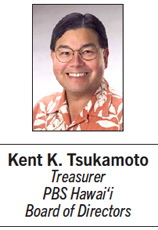The PBS Hawaiʻi Livestream is now available!
PBS Hawaiʻi Live TVSpecial Message
 I’m a numbers guy. It’s my job.
I’m a numbers guy. It’s my job.
As a longtime CPA and as managing partner of one of Hawai‘i’s largest locally owned financial services companies, I know that numbers tell stories, too.
So, with the White House handing Congress a proposed federal budget that would de-fund the nonprofit Corporation for Public Broadcasting, I took a closer look at the numbers in the current federal investment.
 $1.35. That’s the cost of public broadcasting per citizen per year – less than the price of a manapua.
$1.35. That’s the cost of public broadcasting per citizen per year – less than the price of a manapua.
For years now, Republicans and Democrats have vigorously argued and then come together in a bipartisan investment to give public media $445 million a year, with most of the money going directly to support free, noncommercial, locally run PBS television stations and NPR radio stations across the country.
$445 million is 1/100th of 1 percent of the nation’s budget, amounting to $1.35 per citizen per year. The national PBS folks point out that’s less than a cup of coffee. Here, we like to say: That’s less than the price of a manapua – and a small manapua at that.
Most years for PBS Hawai‘i, our part of the national funding amounts to 15 percent, or about $1 million, of our annual revenues. We use the federal investment as seed money to attract contributions from the private sector – “viewers like you.” Individuals, businesses and charitable foundations pitch in. It’s these private gifts and grants, fanned by the spark of federal funding, that provide the bulk of our statewide programming and outreach.
Among the offerings that the federal investment helps us acquire: curriculum-based PBS KIDS programming that boosts our children’s learning; the science show NOVA; the investigative program Frontline; and performing arts on Great Performances. The federal funding also helps to create shows like Na Mele, the only weekly television show featuring traditional Hawaiian music; and Insights on PBS Hawai‘i, the only live hour-long interactive public affairs show on weekly statewide television.
As a lean local nonprofit that’s able to leverage the federal money and also scale our services by sharing program costs nationally in public media, PBS Hawai‘i has a track record of delivering quality shows at very reasonable costs.
To guard against political interference in program content, Congress has provided two-year “forward funding” as a firewall. All of this computes to a successful public-private partnership.
As Neil Shapiro, who heads WNET in New York, observed: “It’s not like cutting this would have any appreciable effect on any taxpayer across the country, but losing PBS would.”
In my view, this is especially true when it comes to the value of PBS’ in-depth news coverage, arts and culture, a safe haven for keiki and a trusted place to air differing perspectives on local issues.
It’s a privilege to volunteer my time as Treasurer of PBS Hawai‘i’s Board of Directors – because I want to support a community treasure that is efficient and collaborative in costs, while providing a significant multiple in the value returned to the people of Hawai‘i.
I see how the federal investment enriches the people of Hawai‘i and keeps our stories alive, our music playing and our home a better, safer place. The numbers tell the story.
If you’d like to help support public media organizations like PBS Hawai‘i:
|
